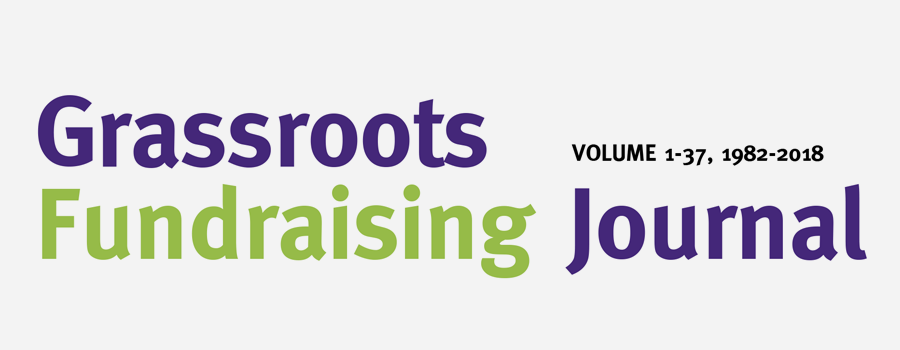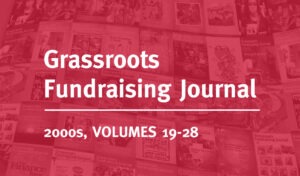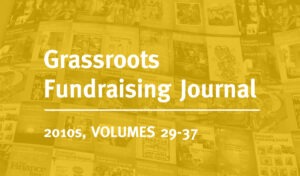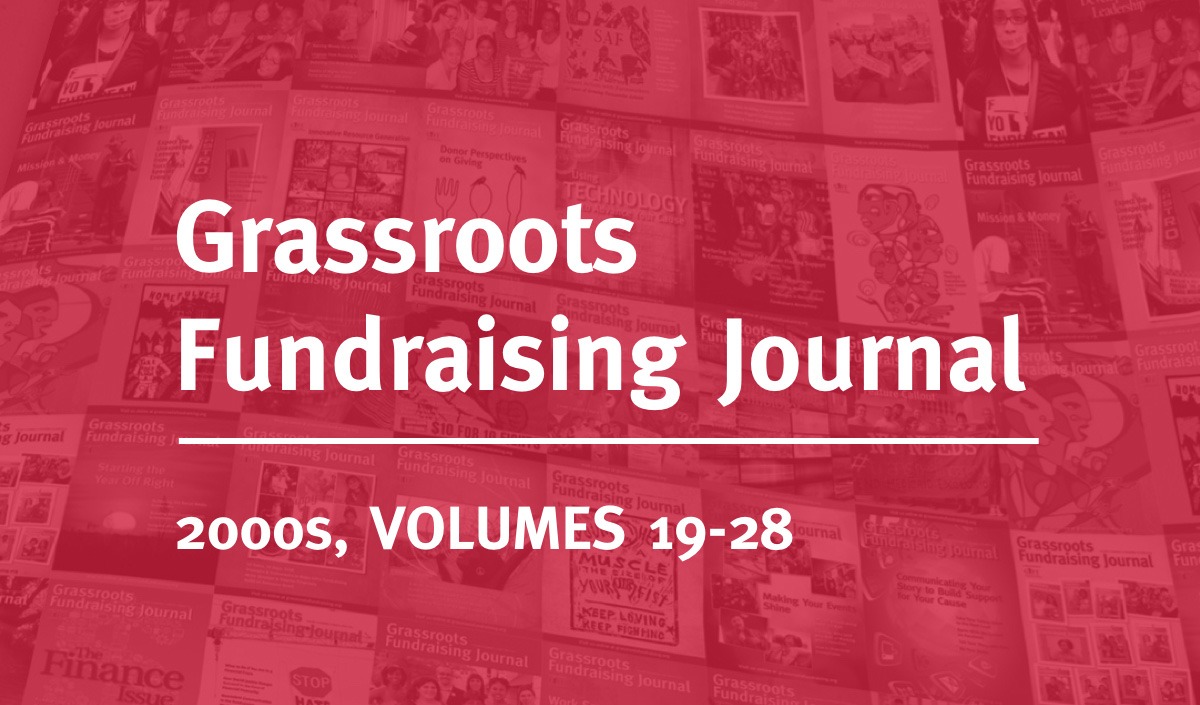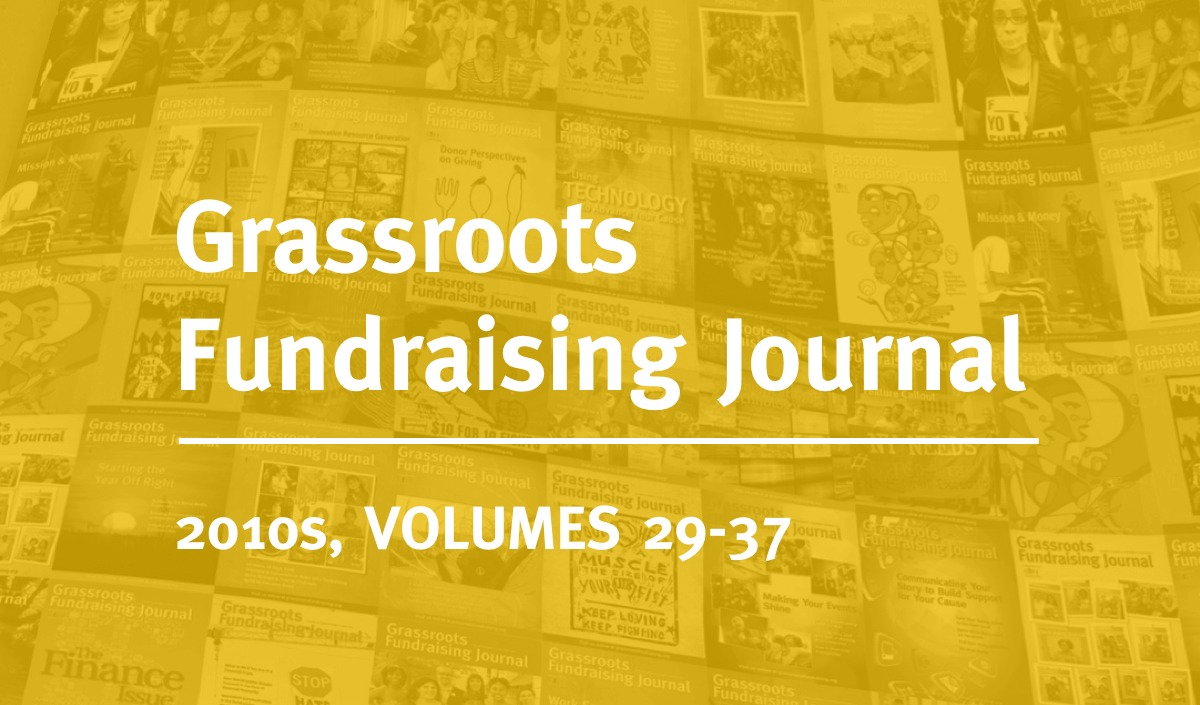
Editors’ note: This article, first published in print during Jan/Feb 2006, has been republished for Nonprofit Quarterly with minor updates.
People who are active in an organization, particularly board members and key volunteers, are natural candidates to solicit major gifts in person from contributors or prospects. An organization may even provide training sessions to increase volunteers’ skill and comfort in making such personal solicitations.
Many people have discovered that doing face-to-face fundraising reminds them of the true depth of their commitment to an organization. They remember why they became involved with the work in the first place and why they think the work is important. Occasionally, people discover in the process of asking for gifts that their commitment is not that strong and that they would be happier in another organization.
People soliciting major gifts for an organization must, first and foremost, believe thoroughly in the cause of the organization. Second, they must have demonstrated that commitment with a financial contribution. The size of that contribution is not important, but it must be an amount that is significant for that individual. Having made their own gift, they convey the message to their prospects (whether simply in attitude or in words as well), “Join me. Do what I have done. Give a large contribution to this organization because it is really important.” Once a solicitor has demonstrated their own commitment, they can approach their prospects with confidence.
TYPES OF PROSPECTS
There are three types of prospects for face-to-face solicitations:
- People who have given before and are prospects for a repeat or upgraded gift
- People who have not given before, but are close to someone in the organization
- People who are interested in the cause but don’t know anyone in the organization.
For people in the last category, some kind of cultivation is necessary before actually soliciting the gift. Inviting the person to a special event, house meeting, or educational evening, or asking to see the person in order to describe the program, should precede the meeting at which a gift is requested. In this article, we will assume that the prospect is ready to be asked for the gift.
APPROACHING THE PROSPECT
There are three steps in approaching the prospect:
- A letter describing the program and requesting a meeting to discuss it further
- A phone call to set up a meeting
- The meeting itself, in which the gift is usually solicited
Obviously, if you are approaching your spouse or your best friend, you can skip the letter and perhaps even the phone call. In some cases the letter will be enough and there will be no need for a phone call and meeting; in others a phone call alone will suffice. Requests for gifts of more than $1,000, for capital gifts, or for multiyear pledges will almost always be more successful in a face-to-face meeting. Further, even when prospects decline to meet, they are pleased that you were willing to take the time to meet with them had they so desired.
Letters to Current Givers
The simplest letter is the one to prospects who have given before. You thank them for their support in the past and ask them to give the same amount or more again. In the letter, describe some of your achievements during the past year and some of your future plans. Tell them you will phone them in a few days and, if they are in your area, offer to meet with them. Enclose a
stamped return envelope.
After a few days, phone them. Often you will discover that the check is in the mail. Over time, you will learn who prefers not to be phoned, but just wishes to be reminded when it is time to renew their gift.
If you do meet with the prospect, ask for a larger gift than they gave last year, or use the meeting as an opportunity to ask for the names of other people who might be interested in giving major gifts. As you get to know the donors, you can see if they would make good board members or if they would be willing to solicit some large gifts on behalf of your organization. Meeting with current donors tells people that they are valued and helps build their loyalty to the organization.
Letters to People Close to the Organization
Letters to prospects in this category should be signed by the person who knows them best. Letters to prospects you know rest heavily on the amount of respect and affection the prospect has for you. When writing to someone you know, use the same tone and format you would use in writing to him or her about anything else. If you normally call the person by their first
name, do that in your letter. Mention to your friend that you are a donor yourself. You don’t have to say how much you give — just the fact that you give will tell your friend that you are asking them to do only what you are already doing.
If the person who knows the prospect is unable or unwilling to write the letter, then the person actually soliciting the gift may be a stranger to the prospect. In that case, begin the letter by making the connection clear: “Jane Friendswithyou gave me your name. She said you might be interested in our work because….” Go on to describe the work of the organization and ask to meet with the person. Indicate in the letter that you will be asking for money. The letter can describe how much the organization needs and what kind of gift you hope the prospect will make.
In writing the letter, remember that people have short attention spans. Make your sentences interesting, evocative, and short. Avoid using jargon or complicated explanations. Statistics are fine, if used sparingly. The idea of the letter is to spark the prospect’s interest so that he or she
will want to meet with you. The letter does not have to convince fully, and in fact, should just raise the person’s interest. The face-to-face meeting is the time to convince the prospect to give.
Sample Letter
Dear Theodora,
You and I have talked about my work with the East Side Senior Advocates, and I have appreciated your support over the years for our various projects. We are now entering one of our most exciting ventures yet — a project to put a Senior Advocate in every neighborhood where more than 10 percent of the population is over 65. This project will involve hiring three more staff people and renting one more office. The benefits far outweigh the costs, however.
I am hoping you will consider making a major gift to this project. We are looking for gifts in the range of $2,000, although gifts of all sizes are needed.
I don’t expect you to decide based on this letter — what I want is for us to meet and talk about the project. I will call you in a few days to see when we can get together.
Sincerely, Anastasia
The Phone Call
If you say you are going to call, call. Rehearse the phone call beforehand to anticipate possible questions or objections the prospect might have. The following examples show three differ- ent problems that arise during phone calls and ways they could be handled.
Scenario One: The Easy Prospect
You: Hello, this is Worthy Cause. Is this Mary Prospect?
Ms. Prospect: Yes, it is.
You: I recently wrote to you about…. Did you get my letter?
Ms. Prospect: Yes, I think I did.
You: Do you have a minute now? (Or, Is this a good time to talk?)
Ms. Prospect: I have just about one minute. Now, remind me of what your organization does. I get so many letters.
You: Our organization…(two sentences at most). What I would really like to do is get together with you for about half an hour to explain our project in more depth. I know you are busy. Is there any time next week that I could come see you?
Ms. Prospect: I think I could fit you in next Wednesday at 10:00 AM.
Sign up for our free newsletters
Subscribe to NPQ's newsletters to have our top stories delivered directly to your inbox.
By signing up, you agree to our privacy policy and terms of use, and to receive messages from NPQ and our partners.
You: Great. I’ll be there. Thanks so much.
Scenario Two: Time and Logistics Problems
Ms. Prospect: This is really a bad time of year for me. I’m doing an inventory and then I have to fly to Washington, D.C., and I just can’t fit in another thing.
You: I can certainly understand that. Why don’t I call you next month and see if things have settled down, and you might have some time then?
Ms. Prospect: That would be fine. Or,
Ms. Prospect: This is just too busy a time for me. I’ll call you when I can work you into my schedule.
You: I know you have a lot on your mind. I’ll call you in a month or so to see if things have settled down.
Or,
Ms. Prospect: I never make decisions to give away such large gifts without talking it over with my husband. We do all our giving jointly.
You: That seems reasonable. May I come and talk to you both?
Scenario Three: Disagreements with the Organization
Ms. Prospect: I got your letter, but I have to tell you honestly that I think the government should be taking care of this, and you all should be lobbying for restored government funding in this area.
You: We agree that the government should be taking care of this problem, and we’re working with a coalition of groups to pressure for restored funding. But in the meantime, these people are without services, and we have to turn to people like you who understand the need so clearly. I’d like to talk with you about our government strategy, since I know that it is an area of interest to you, in addition to discussing our program. Could we meet next week?
Or,
Ms Prospect: Aren’t you the group that had to fire your executive director for incompetence a little while ago?
You: Yes, our executive director was released when the board discovered….I know you’ll be pleased to learn that Much Better Person has taken her place and things are now completely back to normal. I really want to talk about our programs in more detail. Is it possible to set up a meeting in the next few weeks?
Or,
Ms. Prospect: I have other priorities at this time and I’m not sure your organization falls within my present commitments.
You: I know that you have other priorities. I would really appreciate it if we could discuss our organization’s program because I think it fits within your
concerns. Jane Friendswithyou indicated that you are strongly committed to… and we do work in that area now.
Ms. Prospect: I’m afraid you’ll be wasting your time.
You: I’m not worried about that. I don’t want to waste your time, but I do think a brief meeting would help us both to see if we have any goals in common.
THE IMPORTANCE OF BEING ASSERTIVE
Most of the time when people put us off we assume that they are trying to say no but are just too polite to come right out with it. This is a false assumption. Prospects are looking for signs that you are really serious about your organization. They appreciate persistence, assertiveness, and an attitude that what you have to offer is critically important and worth taking some time to discuss.
If you are easily put off and take the first no as the final answer, it tells the prospect that you are not terribly concerned about the organization, or that you don’t really care whether or not the prospect gives. Clearly, you don’t want to be rude, but you need to be willing to push the prospect a little; don’t take the first resistance as the final word.
THE FACE-TO-FACE MEETING
Once you have an appointment, you are ready to prepare for the face-to-face solicitation. This is not as frightening as it seems. First of all, the prospect knows from your letter or your phone call that you will be talking with them about making a contribution. Since they have agreed to see you, the answer to your request is not an outright no. The prospect is considering saying yes. Your job is to move them from “I’m considering giving” to “I’d be delighted to give.” The purpose of the meeting is to get a commitment to give. Everything else revolves around this purpose. It is fine for the conversation to go off on a tangent, but you must keep bringing it back to the financial needs of the organization and the possible role of the prospect in meeting those needs.
As the solicitor, you must appear poised, enthusiastic, and confident. If you are well prepared for the interview, this will not be too difficult. Many times, board members and volunteers are afraid they will not appear knowledgeable about the organization. It is perfectly fine for them to bring along a staff member or someone who has been with the organization for a long time and who can answer difficult questions. Sometimes going with a partner also helps you feel more relaxed. It is also fine to answer a question with, “I don’t know, but I’ll be glad to get you that information.”
In the meeting, your role is to help the prospect to see that giving to your organization is a logical and natural extension of his or her interests and concerns. Ask the prospect questions, and carry on a conversation with him or her. “Do you agree with our approach?” “Did you see the article about us in last week’s paper?” “Has Jane Friendswithyou talked much about our organization?”
When you finally ask for the gift, look the prospect right in the eye and in a clear, bold voice say, “Can you help us with a $300 contribution?” or, “We are hoping you can give $500 to $1,000.” Keep looking at the prospect, and don’t say anything after you have asked for the gift. It is the
prospect’s turn to speak.
Although it may seem like a long time between your request and his or her response, it is only a matter of a few seconds. Sometimes the prospect will say, “I’d like to help, but that figure is way out of my range.” Your response can be, “What would you feel comfortable giving?”
After you ask for the gift and get an affirmative answer, discuss how the prospect wants to make the gift. Perhaps they will give you a check right there, or mail it in the return envelope you brought. For larger gifts, prospects (now donors) may want to transfer stock, or make other arrangements that will cause the gift to arrive in a week or two.
Once these arrangements are made, thank the donor and leave. Immediately after the interview, send the donor a thank-you note. Another thank you from the organization should be sent when the money arrives.
BUILDING A STRONGER ORGANIZATION
Although it can be anxiety producing to ask for money the first few times you do it, it is thrilling to get an affirmative commitment from a major donor. It is also a good feeling to know that you were able to set aside your own discomfort for the greater purpose of meeting the needs of your organization. Knowing that you can talk comfortably about the financial goals of your organization is empowering. Boards of directors find that they are immeasurably strengthened when each of their members feels able to ask for money.

